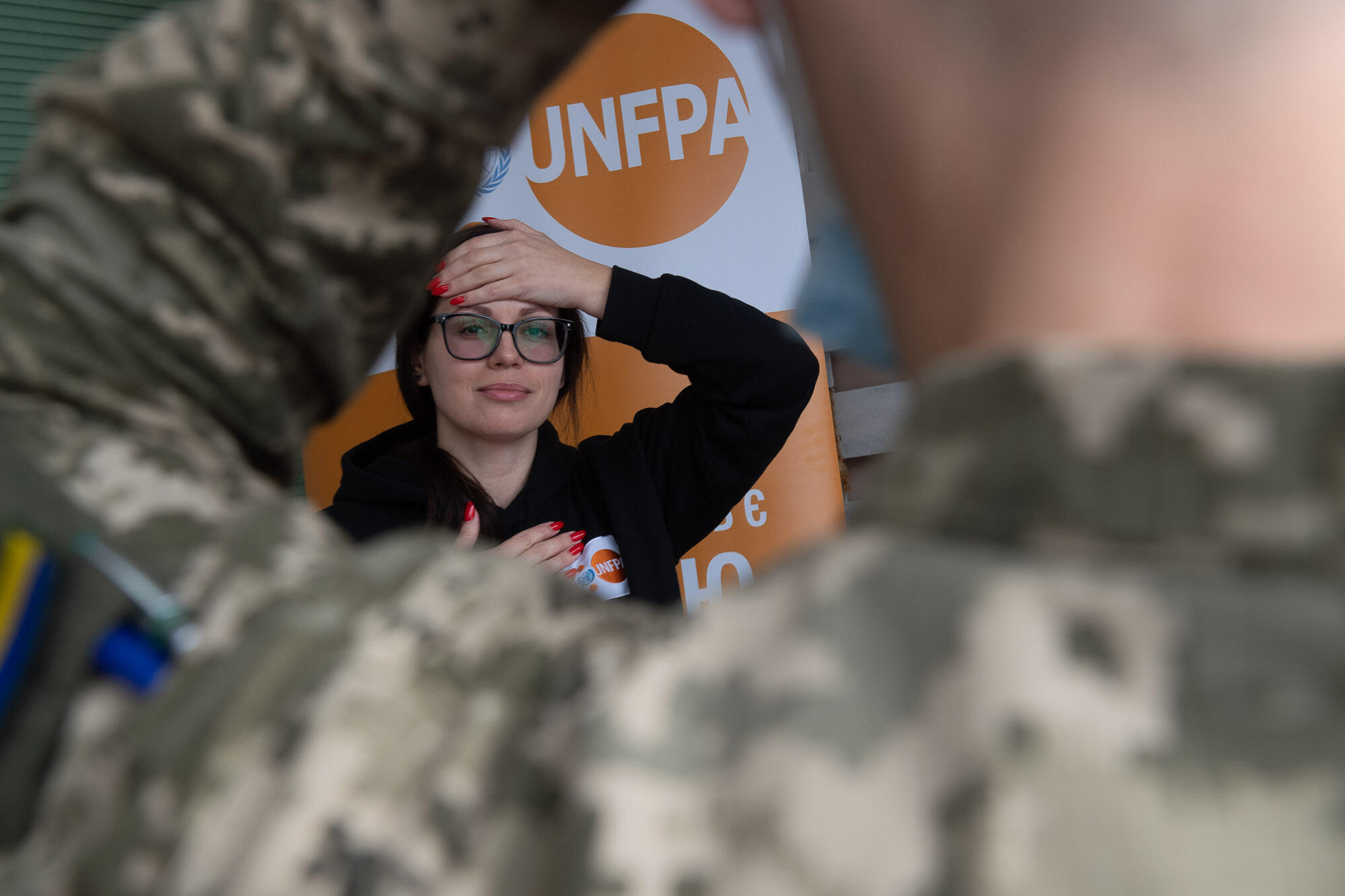In November 2019, the United Nations Population Fund together with the implementing partner ICF Ukrainian Foundation for Public Health with the support of the UK Government launched mobile teams of social and psychological assistance to ATO/JFO veterans and their families.
Six mobile teams were formed in the Kyiv and Mykolayiv Oblasts. They provide assistance and counseling to veterans and their families in urban and rural areas, facilitate veterans’ access to necessary social and psychological services, and rehabilitation services. Providing support to veterans greatly enhances their communication and relationships with family, relatives, and the community. Mobile teams come to the clients’ place of residence, as well as provide telephone and online consultations.
On March 1, 2021, the Final Forum “Practices, work experience and prospects of providing social and psychological assistance to the ATO/JFO participants and their families” was held.
During the Forum, the best practices and successful cases of providing social and psychological assistance to ATO/JFO participants and their families in Ukraine were presented, the needs, opportunities, value and prospects of providing such support were discussed. The Forum also hosted a small performance “Story of One Stage of My Life”, which demonstrated how the mobile team works.
Nicolas Harrocks, Deputy Head of Mission at the British Embassy in Ukraine took part in the Forum and noted:
“Psychological support for all those who experienced severe stress is no less important than the assistance of social communities, family, friends and society as a whole. And today we are working to provide people with psychological support even during a pandemic. We do this because we understand what inevitable consequences we will then have to overcome if such issues are not addressed timely. Surviving severe stress in almost 20% of cases can change a person’s behavior. And timely assistance, especially provided by people who understand the causes of stressful situations, or experienced them, or have faced similar situations can help regain self-confidence, reinvigorate the return to normal life, which in turn will help reintegrate a person into the society”.
Returning from the conflict zone, veterans feel disconnected from traditional support systems. It is often believed that their spouses don’t understand them because they didn’t go through the same situations, so a priori they cannot understand the difficulties that veterans face during reintegration.
For Andriy, one of the mobile team’s clients, a former ATO combatant, the adaptation period lasted six months. At first he had trouble sleeping, and during the day the stress escalated into quarrels.
The psychologist and social worker with whom Andriy spoke consulted both him and his wife separately. This approach allowed both spouses to control their emotions and prevent psychological violence. In other words, to take into account each other’s emotions.
“I don’t know what my wife was told, but I noticed that conflicts in our family began to smooth out”, Andriy said in an interview.
Another case is the story of Yevhen; his family received psychological assistance from a mobile team in the Mykolayiv Oblast. When performing combat missions, Yevhen was taken prisoner, which greatly affected him.
“After returning from the war zone, after the captivity, I really changed. The mood changed, I became more nervous. I could flare up, I was irritated... Also, there were nervous breakdowns, and it affected the family” he said.
However, at first, it was neither psychologists nor social workers that spoke to Yevhen; it was the so-called “sworn brother”. This is a new role in mobile teams performed by former combatants that have been specially trained for such work. The sworn brothers are a kind of link between the team experts and the veteran’s family.
“We talked with my sworn brother Anatoly... we understood each other, how to act: not to be ashamed to ask for help and talk. And he smoothly handed me over to psychologists”, says Yevhen.
Communication with a sworn brother helped the veteran overcome the consequences of psychological trauma.
During 2020, six mobile teams provided family psychological support, social and psychological assistance in adapting and restoring emotional state, social and family ties, facilitated provision of treatment and health resort rehabilitation, finding employment, issuance of documents, application for benefits, allowances, registration of land plots and addressing domestic violence issues to 6,025 ATO/JFO participants; 3,338 ATO/JFO participants’ families; 139 active-service military personnel.
“It is impressive that the paradigm of assistance is changing. The social policy is not aimed at increasing the pool of those in need of help, but at allowing a person to return to an active group of people that do not need social assistance and can live self-sufficiently. ATO/JFO veterans represent such a group. Therefore, it is necessary to ensure the veterans’ access to all existing rehabilitation programs”, said Pavlo Zamostyan, Deputy Representative of UNFPA to Ukraine at the Final Forum.
The event was also attended by Olha Revuk, Deputy Minister of Social Policy of Ukraine for European Integration, Halyna Skipalska, Executive Director of the ICF Ukrainian Foundation for Public Health, Oleksandr Aliyev, ATO/JFO veteran, ex-consultant of the Borodianka mobile team, state expert of the expert psychosocial rehabilitation group of the Directorate of Rehabilitation, Medical Support and Social Readaptation of Veterans of the Ministry of Veterans Affairs of Ukraine, Yulia Mazur, chief specialist of the expert psychosocial rehabilitation group of the Directorate of Rehabilitation, Medical Support and Social Readaptation of Veterans, Volodymyr Zakaliuzhny, Head of the Mykolayiv Oblast Department of Veterans Affairs of the Ministry of Veterans Affairs of Ukraine and others.


